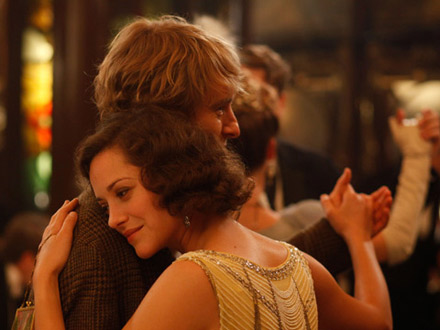Finally got to see the highly-praised new Woody Allen movie, Midnight In Paris, and can safely say that it lives up to the hype. Part romantic-comedy, part dream-sequence, part drama, and part love-letter to Paris, this film is definitely worth seeing.
Like most Woody Allen movies, Midnight In Paris revolves around relationship angst. The oft-underrated Owen Wilson is cast in the Allen-esque role of Gil, a Hollywood screenwriter who has made a fair amount of money off of his soulless blockbuster scripts, but who is now working on his first serious novel. He and his fiance, Inez, are in Paris, and Gil wants to stay. Inez wants to live in Malibu. That Gil and Inez are not right for each other is clearly plain from the start, and before a new potential romantic attachment emerges on the scene, we already hope that their relationship won't make it through 'til the end of the movie.
Gil is a nostalgia hound. He has a particular remembrance of things past that manages to put a rosy glow on what has gone before. He doesn't seem to care much for the present day, and views Paris in the 1920s as the "golden age" of the world. It is this idea (or ideal) that drives the main plot points of Midnight In Paris. Gil has his own notion of when and where the golden age took place, but he meets someone who has a different idea. And then there are folks who have yet another idea about it. I like that the film has this underlying question it wants to debate (and allow for us to debate within ourselves). It makes the movie about something, while still remaining a charming little romantic comedy on the surface.
It's true that, as I get older, times past seem to be remembered with a rosier glow. This, of course, is purely a knee-jerk response. Every time period, era, decade (what have you) has its pros and cons. I remember my late maternal grandmother saying once that the favorite year of her life was 1938. She turned 10 that year. She wistfully remembered the lower price of things, the movies that were playing at the time, her siblings and friends, her parents, etc. And who could have blamed her? I tend to look back upon the 1980s with a plethora of nice memories, primarily due to many of the same reasons. But were the '30s and the '80s really all that much better than today? No, of course not. They were just different.
I thank Midnight In Paris for giving nostalgia a proper perspective. It's one of those indulgences, not unlike chocolate and alcohol, that is good in small doses, but too much of it will make you sick. Better to live in -- and appreciate -- the present.

Comments
Post a Comment